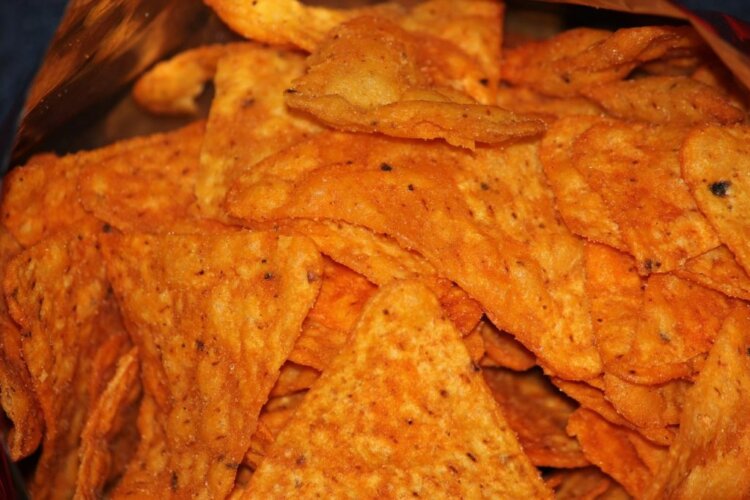
This week, the internet announced that Doritos was developing “lady-friendly” snacks, along with the messaging that women should not be eating crunchy foods or licking cheese dust gratuitously off their fingers in public, and that all women eating should be more like the quiet women in yogurt commercials. These would be just less crunchy, cheesy versions of the same chip, because woman shouldn’t be eating crunchy, messy things in public like wild animals. I hear you loud and clear, Doritos. Loud and clear.
For me, the timing of lady Doritos was apropos. I have spent the last 16 months losing weight, getting in shape, and reflecting back on years and years of people having something to say about what I was eating, and by default, my body. And these messages I received and struggled with for years are actually being sent to all women, all the time. We are regularly told that “diet” food is for us, foods that make noise should not be eaten around other people, and that on dates we should order things like salmon and salad instead of what we actually want to eat (although sometimes I want salmon and salad, it’s not because you told me to eat it). And “Lady Doritos” isn’t even the equivalent of suggesting we eat a salad instead of french fries. It’s the equivalent of replacing our fries with soggy fries called “lady fries.”
For years, I have listened to bosses, teachers, flight attendants, comedy club owners, friends, sales associates, and strangers give me unsolicited, unwanted feedback on my breakfasts, and lunches, and dinners, and snacks and quite frankly, I am exhausted by it. NOT ONE of your comments talked me into losing weight, or getting healthy, or loving my body. NOT ONE piece of advice was helpful.
A few years ago, I had a boss comment about how many chicken nuggets were on my plate at a work conference. At boarding school, a staff member regularly commented about the amount of bread I was eating during snack time. At a restaurant, I once ordered fries and was instead brought out a salad “because it was a better choice,” the waitress said. Those are three examples out of THOUSANDS of words said to me, full of judgement, about the food I was eating.
So here’s a simple rule. Never comment on what other people are eating. Never. Just don’t do it.
I get it, we all want people to be healthy, especially the people we care about. But stop. Because your words are never helpful and always hurtful. Words like those can even cause eating disorders. If I looked you in the face and asked for your help, great – but 99.9 percent of the time, you were giving me unsolicited advice about MY food and MY body. If I wasn’t ready to change my lifestyle, your comments certainly didn’t help. If I was changing my lifestyle in my own way, your comments also didn’t help. They reinforced messages of shame around food intake and body expectations and what the world does and doesn’t view as having worth. They made me want to eat quietly and alone, where there was no external judgement (I always have plenty of judgement from myself).
You never know what is going on behind closed doors, or why someone puts on weight. You could not have known that the medicines for my neurological disorder ruined my metabolism and made it so I never felt full. You could not have known that I grew up in an abusive household where from a young age, my coping mechanism was food; food kept me alive through some awful years. You could not have known that after significant abuse, I stopped caring about my body. You will never know what is happening in somebody’s mind or heart, or how they see themselves, so why do you feel like you can comment on their food and by extension, their bodies?
Now that I have drastically changed my body, people still comment. This time it’s making sure I am eating enough, or asking how I am losing the weight (totally a valid question but know that my answer is that I am eating whatever I want, whenever I want). I am tired of the food I eat being your problem. It’s not. A few weeks ago my mom asked me if I should be eating what I was eating, and suddenly, I couldn’t hear the signals my body was sending to me, the signals I spent months reconnecting with and learning to listen to.
So stop. Everybody stop. Care about what you are eating and if you really, really, really need to say something to me, tell me I am looking strong. Because I am. I run and lift weights and work out with a trainer and I am a badass in the gym, and sometimes I eat chocolate and sometimes I eat chips in public, loudly. I won’t feel bad about the food I eat. In fact, I will feel great about it. Chocolate is delicious, and I feel good when I eat it. I also feel good in the gym, going for walks, doing comedy, and cuddling.
I am going to keep fueling my body, enjoying my food, tuning out the messages from society on what I “should” be eating, and working to live in a body that feels strong and healthy. I am just now learning to connect with this body, and THIS body that certainly isn’t going to buy lady Doritos, because you have got to be f-ing kidding me.
 Pamela Rae Schuller is a New York City-based, internationally-known disability and mental health advocate and professional stand-up comedian. Pamela’s stories of growing up in a body she had no control over are engaging, powerful, a little bit heart-wrenching, and unapologetically funny. Pamela doesn’t just “tolerate” what makes her different; she embraces it, loves it, and finds the funny in it… all while challenging her audiences to do the same. Learn more about Pamela’s work at: www.StandUpInclusion.com
Pamela Rae Schuller is a New York City-based, internationally-known disability and mental health advocate and professional stand-up comedian. Pamela’s stories of growing up in a body she had no control over are engaging, powerful, a little bit heart-wrenching, and unapologetically funny. Pamela doesn’t just “tolerate” what makes her different; she embraces it, loves it, and finds the funny in it… all while challenging her audiences to do the same. Learn more about Pamela’s work at: www.StandUpInclusion.com
[interaction id=”5a7b77e9058c3c0001c14e0a”]


Grok Nation Comment Policy
We welcome thoughtful, grokky comments—keep your negativity and spam to yourself. Please read our Comment Policy before commenting.